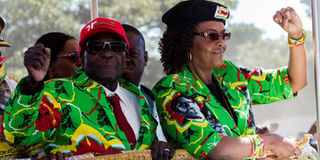Mugabe’s fall: Some lessons for Uganda

Mr Mugabe and his wife Grace
After celebrating the resignation of their president, Mr Robert Mugabe's on Tuesday, Zimbabweans could be returning to their ordinary lives.
Parts of the country remain desperately poor after years of economic mismanagement and corruption under Mr Mugabe's rule but the question that now lingers in the mind of every Zimbabweans is; who will fill the void left by the veteran leader?
Local people says it is not clear whether the military, whose intervention a week ago, brought about Mr Mugabe's fall, will continue to play an active and visible role in the country's political scene.
Reports from Harare, however, have indicated that the interim leader of the ruling ZANU-PF party, former Vice President Emmerson Mnangagwa is widely expected to take over the presidency.
What happens to Mugabe?
He resigned with immediate effect on November 21, but it's unclear whether there will be an investigation into some of the allegations against him and his wife Grace, who is accused of usurping her husband's executive powers.
However, although it turned against him, the ruling ZANU-PF has paid tribute to Mr Mugabe for his 40-year leadership of the party.
Mr Mugabe will be remembered for the massacres in Matabeleland in the 1980s, for the farm invasions of the 1990s and later, and for the brutal repression of the opposition Movement for Democratic Change when it seemed on course to win the 2008 presidential election.
The man who seems about to take his place, Mr Mnangagwa, was reportedly involved in most of those crimes, yet people in Zimbabwe, like the outside world, will be so relieved to see Mr Mugabe go away and will be tempted to forget all this.
Lessons for Uganda
The Deputy Secretary General of the ruling National Resistance Movement, Mr Richard Todwong says that the Zimbabwe situation teaches Ugandans leaders some lessons.
“It teaches us that as leaders, we need to do things in the interest of the citizens we govern because they have the power to revolt,” said Mr Todwong.
The Forum for Democratic Change (FDC) presidential aspirant Gen Mugisha Muntu said although it is not clear who will end up leading Zimbabwe, whoever prevails will need the backing of both the military and the citizens.
“And as Uganda we must know that no autocrat lasts forever,” Gen Muntu said.
The party Secretary General, Mr Nathan Nandala Mafabi said the Zimbabwe situation teaches Ugandan leaders clearly that they are expected to listen to their people.
"The country is older than all leaders and the Zimbabwean situation is the climax of every bad government. You can squeeze people for some time but not all the time and all governments need to follow up their promises in every nation,” Mr Mafabi said.
The UPDF spokesperson Brig Richard Karemire declined to comment and referred this reporter to the Minister of Foreign Affairs.
Mr Nobert Mao, the president of the Democratic Party says the Zimbabwe situation teaches Ugandans never to give up the struggle against bad leadership.
“The people of Zimbabwe have been struggling for a long time and they never gave up, I am pleased that they achieved their mission and Ugandans should not give up, there is light at the end of the tunnel,” Mr Mao said.
Dr Patrick Wakida, the executive director of Research World International, said the biggest lesson Uganda has learnt is that no matter how you do it as a leader, time comes when you must leave the stage for another person.
“Age is not a number; age is a factor that comes with tiredness and inability to perform. So, when the country says you are tired, go because it is very dangerous to play games in a generation which does not belong to you,” he said.
He described the jubilation by opposition in Zimbabwe as short-sightedness and urged them to re-position themselves in the transitional government before free and fair elections.




